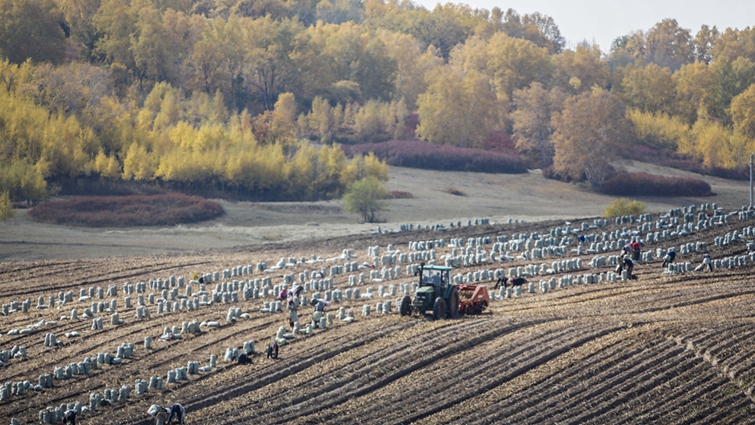05:30

With a special edge in the agriculture sector, North China's Inner Mongolia Autonomous Region, the country's widest province by latitude, has a strategic goal to develop itself into a manufacturing base for the agricultural industry.
In an interview with CGTN, Huang Zhiqiang, the vice chairman of the autonomous region, explained the roadmap for local financial industry and how the local finance sector facilitates a high-quality growth path.
CGTN: What has the Inner Mongolia Autonomous Region government done to stabilize the regional economy under coronavirus?
Huang: The first thing for us was to make full use of the preferential policies like special re-lending funds, re-discounts and reserve requirement ratio cut. In such ways, we provide more liquidity and help financial institutions have stronger capacities to serve the real economy and better support the work resumption of enterprises.
Especially, we increase the credit and loan supply for small and medium-sized enterprises (SMEs) in the private sector and agriculture-related areas to fully ensure market entities' proper operations. At the same time, we encouraged banks to allow SMEs to delay loan repayments if necessary.
Banks in the autonomous region allowed delayed repayment of principal and interest on loans of 101.4 billion yuan ($15.7 billion) during 2020, which benefited around 50,000 companies.
The second measure is expanding our fiscal spending to help enterprises access financing by providing financial guarantees. We build a loan financing platform for small and medium-sized foreign trade enterprises to support their businesses.
Last year, the balance of loans guaranteed by financing guarantee institutions within the autonomous region increased by 7.7 percent annually to 34 billion yuan. Around 78,000 companies were able to access financing, which is an increase of 69 percent year on year.
CGTN: China has always stressed that finance needs to serve the real economy. We know Inner Mongolia has a very large agricultural region. So how is finance here working to serve the agriculture sector?
Huang: We come up with a concept named "agriculture and husbandry dividend" based on a survey.
First, we set up a mechanism comprised of "leading banks" to lead the research on promoting financial service in key industries.
Second, we set up county-level targeted financial institutions. These special branches act as grassroots outlets and are close to the local market. They also act as professional branches to focus more on the development of the industry's value chain.
We use professional institutions to expand new market shares and use their expertise to avoid operational risks and improve the autonomous region's quality of inclusive finance.
The third initiative is to call for active collaboration among government, banking and insurance industries to innovate products, service models and provide multiple innovative financial products.
For example, China Construction Bank launched a special loan scheme in Arun Banner, which allows the transfer of land-use rights as collateral. Users could also transfer their land rights online via a local land transfer platform.
CGTN: We know recently you signed a strategic cooperation agreement with Shanghai Stock Exchange (SSE). Give us more details in terms of the agreement, and what do you want to achieve through the partnership?
Huang: To be frank, Inner Mongolia's capital market remains a weak spot for us and still acts as a bottleneck for greater economic transformation and development.
Last December, our chairwoman Bu Xiaolin paid a visit to the SSE and reached a consensus on further cooperation. They also renewed their comprehensive cooperation agreement. The agreement is very important and covers four main aspects.
First, both sides would help qualified companies in Inner Mongolia get listed on the SSE, and the Science and Technology Innovation Board, known as the STAR market.
Second, both parties are to explore a list of high-quality companies which have the potential to be listed. And the SSE will use its expertise and professional knowledge to provide technical support, early-stage services and targeted training for these firms.
The third is both sides will strengthen regulatory supervision and collaboration to support mergers and acquisitions and refinancing of listed firms. We will promote the transformation and upgrading of enterprises, making them better and stronger.
Fourth is both sides will help issuers within the autonomous region to issue bonds on the SSE. The SSE would provide professional service to train more talents for Inner Mongolia and guarantee enough talents to support local capital market development.
(Michael Wang also contributed to the story.)

